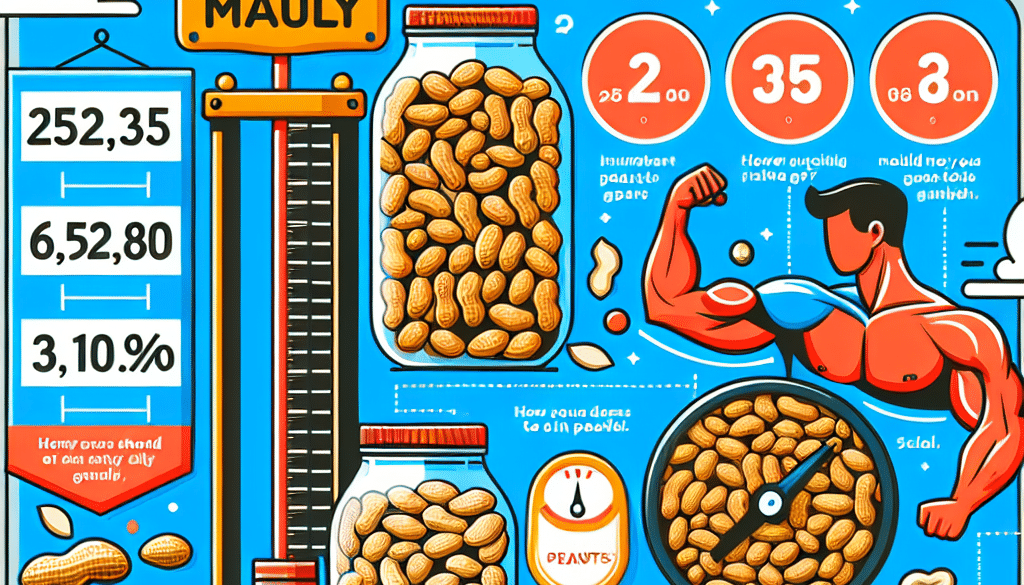How Many Peanuts A Day To Gain Muscle?
-
Table of Contents
- Maximizing Muscle Gain: How Many Peanuts Should You Eat Daily?
- The Nutritional Profile of Peanuts
- How Many Peanuts to Eat for Muscle Gain
- The Role of Peanuts in Muscle Recovery and Growth
- Integrating Peanuts into Your Muscle-Building Diet
- Case Studies and Research on Peanuts and Muscle Growth
- Conclusion: Balancing Peanuts for Optimal Muscle Gain
- Discover ETprotein’s Premium Protein Products
Maximizing Muscle Gain: How Many Peanuts Should You Eat Daily?

When it comes to building muscle, diet plays a crucial role in providing the necessary nutrients for muscle repair and growth. Peanuts, a nutrient-dense legume, are often considered a beneficial snack for those looking to increase their muscle mass. This article delves into the role peanuts can play in a muscle-building diet, how many you should consume daily, and the science behind their benefits.
The Nutritional Profile of Peanuts
Peanuts are a powerhouse of nutrition, packed with protein, healthy fats, and various vitamins and minerals essential for muscle growth. A single ounce (about 28 grams) of peanuts contains approximately:
- 7 grams of protein
- 14 grams of fats (predominantly monounsaturated and polyunsaturated fats)
- 2.4 grams of dietary fiber
- 4.6 grams of carbohydrates
- Minerals such as magnesium, phosphorus, and potassium
- Vitamins like niacin, folate, and vitamin E
Given their high protein content, peanuts are an excellent addition to a muscle-building diet. Protein is the building block of muscle, and consuming adequate amounts is essential for muscle repair and growth.
How Many Peanuts to Eat for Muscle Gain
While peanuts are beneficial for muscle growth, moderation is key. The recommended daily intake of peanuts for muscle gain depends on various factors, including your overall diet, caloric needs, and physical activity level. Here’s a general guideline:
- For sedentary individuals: A handful of peanuts (about 1 ounce or 28 grams) can be a healthy addition to the daily diet.
- For active individuals or athletes: Two to three handfuls of peanuts (about 2-3 ounces or 56-84 grams) can be incorporated into the daily diet, spread throughout the day.
It’s important to note that these are general recommendations and individual needs may vary. Consulting with a nutritionist or dietitian can help tailor your peanut intake to your specific goals and dietary requirements.
The Role of Peanuts in Muscle Recovery and Growth
Peanuts contribute to muscle recovery and growth in several ways:
- Protein Synthesis: The amino acids in peanut protein are essential for the synthesis of new muscle proteins.
- Energy Supply: The healthy fats in peanuts provide a sustained source of energy for workouts and recovery.
- Reducing Inflammation: Antioxidants like vitamin E help combat oxidative stress and inflammation, which can hinder muscle recovery.
Moreover, the magnesium in peanuts is crucial for muscle function and can help prevent cramps and fatigue.
Integrating Peanuts into Your Muscle-Building Diet
There are various ways to include peanuts in your diet to support muscle growth:
- As a snack between meals to maintain energy levels and provide a protein boost.
- Incorporated into smoothies or shakes for a post-workout recovery drink.
- Added to meals like salads, stir-fries, or oatmeal to increase the protein content.
Remember to account for the additional calories from peanuts in your overall diet to maintain a balanced caloric intake.
Case Studies and Research on Peanuts and Muscle Growth
Several studies have highlighted the benefits of nuts, including peanuts, for muscle health. For instance, research published in the “Journal of the International Society of Sports Nutrition” suggests that nuts can provide essential amino acids necessary for muscle repair and growth. Another study in the “American Journal of Clinical Nutrition” found that regular nut consumption was associated with a lower risk of sarcopenia, a condition characterized by muscle degeneration.
Conclusion: Balancing Peanuts for Optimal Muscle Gain
In conclusion, peanuts can be a valuable addition to a muscle-building diet due to their high protein content, healthy fats, and essential nutrients. While there is no one-size-fits-all answer to how many peanuts one should eat daily to gain muscle, incorporating a moderate amount based on your activity level and dietary needs can contribute to muscle growth and recovery. Always consider the caloric content and balance your intake with other nutrient-dense foods to achieve the best results.
Discover ETprotein’s Premium Protein Products
If you’re looking to supplement your diet with high-quality protein sources, consider ETprotein’s range of organic bulk vegan proteins. Their products, including peanut protein, are designed to cater to various dietary preferences and are ideal for those seeking to enhance their muscle-building regimen. With a commitment to non-GMO, allergen-free ingredients, and high purity levels, ETprotein is a trusted choice for athletes and health enthusiasts alike.
About ETprotein:
ETprotein, a reputable protein and L-(+)-Ergothioneine (EGT) Chinese factory manufacturer and supplier, is renowned for producing, stocking, exporting, and delivering the highest quality organic bulk vegan proteins and L-(+)-Ergothioneine. They include Organic rice protein, clear rice protein, pea protein, clear pea protein, watermelon seed protein, pumpkin seed protein, sunflower seed protein, mung bean protein, peanut protein, and L-(+)-Ergothioneine EGT Pharmaceutical grade, L-(+)-Ergothioneine EGT food grade, L-(+)-Ergothioneine EGT cosmetic grade, L-(+)-Ergothioneine EGT reference grade and L-(+)-Ergothioneine EGT standard. Their offerings, characterized by a neutral taste, non-GMO, allergen-free attributes, with L-(+)-Ergothioneine purity over 98%, 99%, cater to a diverse range of industries. They serve nutraceutical, pharmaceutical, cosmeceutical, veterinary, as well as food and beverage finished product distributors, traders, and manufacturers across Europe, USA, Canada, Australia, Thailand, Japan, Korea, Brazil, and Chile, among others.
ETprotein specialization includes exporting and delivering tailor-made protein powder and finished nutritional supplements. Their extensive product range covers sectors like Food and Beverage, Sports Nutrition, Weight Management, Dietary Supplements, Health and Wellness Products, and Infant Formula, ensuring comprehensive solutions to meet all your protein needs.
As a trusted company by leading global food and beverage brands and Fortune 500 companies, ETprotein reinforces China’s reputation in the global arena. For more information or to sample their products, please contact them and email sales(at)ETprotein.com today.












